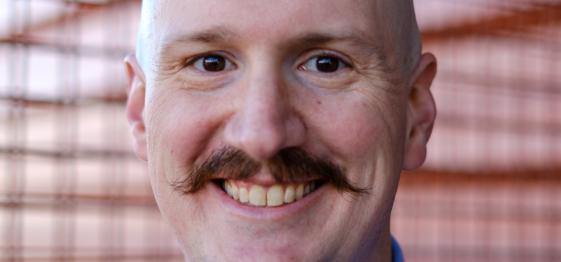Senator Spotlight April 2023
Categories:
Senator Spotlight
NAME: David Burel
What unit do you represent?
I represent the Interdisciplinary Humanities and Communication unit within the College of Integrative Sciences and Arts.
How many years have you served in the Senate?
This is the end of my second year in the Senate.
How many years have you been employed at ASU?
I’ve worked for ASU for about five years since Fall 2018.
What other institutions have you taught at before coming to ASU?
I’ve taught at Auburn University both as a graduate instructor and as an adjunct. I also served as adjunct at Auburn University Montgomery.
What is your research and/or creative activities focus?
My current research focuses on people living, dwelling, and traveling with technology to pursue personal expression, leisure, and beliefs. It also highlights how enthusiasts, users, and consumers actively create and modify technology. My book manuscript, titled “From Rolling Bungalows to Mobile Mansions: The Origins of America’s Obsession with Recreational Vehicles.” My manuscript grows from my dissertation research studying the intersection of technology, tourism, and American culture. The work focuses on the role of enthusiasts, primarily during the interwar era, in designing and manufacturing the earliest recreational vehicles, which has become a multi-billion dollar industry today. My research also traces the flexibility of the recreational vehicle concept as various users have adapted it to their own individual needs, wants, and desires. I argue that the recreational vehicle’s success comes from this adaptability and user interpretation.
My future research project focuses on the deployment technologies and conspicuous designs in domestic architecture that demonstrate the ideology and beliefs of the owner. I am co-authoring an article on smart home technology’s history as it connects to 20th Century concepts of the “house of the future” and trends in designing technologically integrated homes. Additionally, I am undertaking individual research into architectural examples of environmentally inspired living spaces. The American Southwest in the 1980s and 1990s played host to radical architectural concepts that addressed growing concerns about the Earth’s environment and responded to fears of its continued degradation. For example, Architect Michael Reynolds designed and built his Earthship homes in New Mexico to use ecological and earth science concepts to achieve a lifestyle with a limited environmental impact. I also envision a future project related to the recreational vehicle manufacturing industry centered in Elkhart, Indiana, looking at the manufacturing and labor history.
Why did you decide to get involved with the Senate?
Being involved with shared governance is essential for a well-functioning University. In particular, I wanted to keep updated about current events at ASU to be able to provide timely information. I previously served as an SGA representative at Auburn University while representing the Graduate College in a student governance body mostly oriented towards undergraduate needs. I also served on the Graduate Student Council at Auburn University.
Describe what you have learned (or hope to learn) during your time in the Senate?
I have wanted to learn more about the ASU shared governance model. Having issues, ideas, and feedback routed correctly to the right parts of an organization is one of the most critical functions of university governance. To be able to do my job as a senator, I need to know how to connect concerns with the correct people to be able to address them.
What committees have you participated in, or would like to participate in and what were you able to (or hope to) accomplish?
I’ve worked for two years on the Committee on Committees. I must admit, I initially did not feel very excited to serve when assigned in my first year, mainly because I did not understand its function. Now after two cycles of helping to prepare for elections and receive nominations, I see the great value in the committee and its essential role internally and externally to the Senate’s functioning.
What would you say to your peers who might be considering accepting a nomination or nominating himself or herself for a position in the University Senate?
Step up to the challenge and try to serve, even if you think it has yet to be your area of expertise. You’ll also quickly find yourself the most up-to-date on various topics within your unit. That kind of first-hand knowledge of ongoing business across the university is beneficial for your colleagues. Also, keep an eye out for the speakers at the senate. I’ve learned so much from the guest speakers from different parts of ASU and ABOR in my last two years.